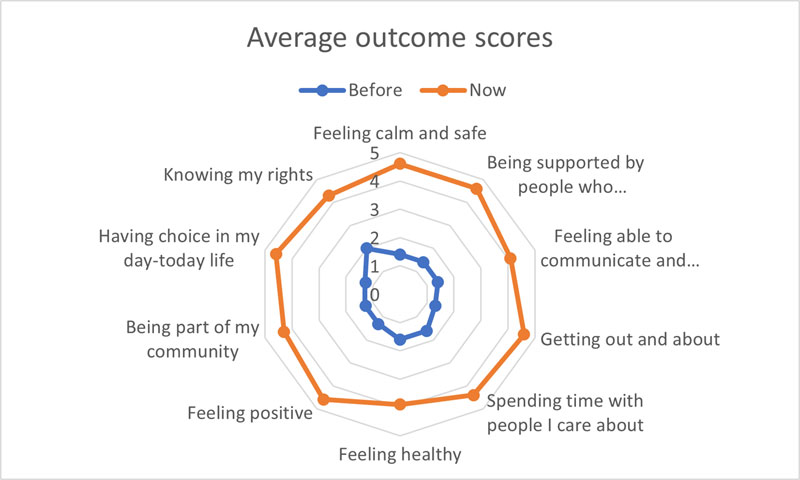
Synopsis
This report was funded by the Department of Health and Social Care (DHSC) and commissioned by the Local Government Association (LGA) in association with the Association of Directors of Adult Social Services (ADASS).
This is not an endorsement of the providers mentioned but they were independently identified as organisations delivering highly personalised support.
Scope and background
This report was commissioned by Partners in Care and Health and is an evaluation produced by Sarah Holmes, Director at Imagineer.
This report will explore new, current, and emerging models of support for autistic people and people with a learning disability to assess efficiency and effectiveness in meeting individuals’ aspirations; that draw on care and support which upholds human rights, enables citizenship and empowers people to have choice and control over their lives and the impact this has on outcomes.
The report is intentionally narrative based with people, their families and the support organisations talking about their experience in moving from institutional care to bespoke support and the impact on the persons quality of life. The report, taken from transcripts of recorded interviews by the report author, will provide case study examples of excellent local practice and promising practice which have led to significantly improved outcomes for people with learning disabilities and/or autism, their families and carers.
Perhaps the most significant element of the report is drawing upon the voices, experiences and stories of the people themselves and their families, in developing an understanding of the elements which enable good, sustainable support which promotes better outcomes and holistic wellbeing for people.
Participants
We have spent time with support provider organisations based in different areas of England. Some of these providers are working in partnership with the NDTi ‘Small Supports’ programme, and some of the providers (although not aligned with ‘Small Supports’) are working in a similar bespoke way with the individuals they support.
There are nine key principles which are applied in the small supports programme:
- From the first steps the person (and their chosen family and friends) has as much control as possible and there is a commitment to this control growing.
- The starting point to developing great support is the person’s aspirations about where they want to live and the life they want to have; conversation about support then follows from this. Compromising on control and aspirations is when things start to go wrong.
- Supporters (staff) are recruited by and around the individual. They don’t work across services. Staff are not a substitute for friends, community peers, co-workers and neighbours.
- People choose where they live and who, if anyone, they live with. People are the tenant or owner of their own home or perhaps live with family. There is a clear separation of housing and support.
- Funding is sustainable and is designed and used around the individual.
- Small supports organisations stay with people. Change and challenges are expected so they don’t withdraw support or ‘sell’ services on.
- In their work, leadership, recruitment and actions, small supports organisations are rooted in their local community.
- The organisations stay relatively small. Knowing each person well means not growing by more than three to five people a year and finding a natural size where people are known and valued, and the organisation is financially sustainable.
- Small supports organisations are developed around these practices. Taking some of these practices and making them aspirations within large, segregated services will not deliver the desired outcomes.
The range of organsiations contacted were those identified working in local areas and delivering bespoke support developed with and around an individual.
We have interviewed representatives of the provider organisations, the person they support, family members, local authority commissioners, social care practitioners from local councils; and adult social care senior leaders who promote a bespoke approach to care and support in their area. There were challenges in securing engagement from all parties in each instance, despite a range of people making contact, the report was therefore unable to offer the commissioner or social worker voice for each case study. It felt important however to produce the report and showcase some of the positive work happening in England to support people to live great lives beyond the institution.
Measurement of outcomes
A set of 10 outcome descriptors was developed for the evaluation. The ‘Wheel of Life’ tool was used to captured the life experience of the person ‘before’ and ‘after’ their bespoke housing and support arrangements were in place:
- feeling calm and safe
- being supported by people who understand me well
- feeling able to communicate and being listened to
- getting out and about
- spending time with people I care about
- feeling healthy
- feeling positive
- being part of my community
- having choice in my day-to-day life
- knowing my rights.
These were identified from previously co-produced pieces of work such as the Good Lives Framework (Learning Disability England) and Making it Real (TLAP)
The following case studies represent the narratives which were gathered through the interview process. Each case study is accompanied by a set of outcomes measurements, tracking the improvement in people’s wellbeing and general life experience.
The outcomes measurement tool we used was the Wheel-of-life, drawn from life coaching approaches.
The tool is visual and provides a clear representation of change over time. The person applied a score out of five to each outcome heading (zero being least, and five being most). Each person we developed a case study with provided a set of scores for their life before and now.
A strong element of each narrative is shared from the provider organisations supporting each person, to provide insight into the provider experience in developing and sustaining bespoke support solutions for the people they support. This insight will enable the identification of key themes which emerge from many of the narratives and provide opportunity for learning, reflection and development of strategy which supports this way of working.
Case studies
Conclusion
Potential long-term outcomes from the development of bespoke housing and support solutions could include:
- People with a learning disability and/or autistic people are only admitted to hospital for therapeutic reasons and only for a short period of time.
- Development of a provider and housing market which is skilled and experienced in supporting people with ‘hefty reputations’ to live safe, ordinary lives in local communities and close to those they care about.
- Acknowledgement within strategic plans that long-term cost savings can be realised over longer periods of time. Savings would not be immediate, but this could in turn result in a reduction in hospital admissions/crisis intervention (both initial admissions, and also re-admissions) where bespoke models of housing and support are implemented.
- Flexible and creative use of budgets; including funding models which promote choice and control would help to meet the objectives set out within the NHS long term plan, and the Care Act 2014; as well as the adult social care outcomes framework relating to personalisation.
- New integrated care boards offer an opportunity to develop more integrated approaches to support and wellbeing across health, social care and education; and a new approach to stimulating the housing and social care provider marketplace.
- Harnessing the value of independent advocacy and brokerage support in enabling good support ‘first time around’, rather than as a last resort after everything else has been tried, and after the person has experienced significant trauma; therefore reduces the trauma impact of long stay inpatient settings.
- A higher degree of inclusion and involvement for local citizens; social value, local economy benefits, and citizenship for marginalised and isolated people groups.
There isn’t currently a blueprint for doing things differently. Local authority areas are having to do their own exploration about what’s possible, what’s available and new ways of making things happen. In some of the narratives shared, commissioners seemed uncomfortable with doing things differently. A central resource hub, including case studies and emerging models of best practice would support flexible and creative commissioning for future support.
The provider market seems to be willing to work in this bespoke way, but needs support from commissioning in order to do things differently. This type of support requires a significant shift from traditionally commissioned support services, so providers need support with understanding how to do this well. This could include access to helpful training and resources which support the organisational changes which are required for providers to respond to this growing need.
We need to think about how we are measuring wellbeing so that we can actually reflect the difference being made in the person’s overall wellbeing, and their experience of a good life.
Overall wellbeing scores
The following scores reflect an average taken of the scores gathered from each person’s individual narrative during the evaluation process. There is a clear difference between inpatient support (‘before’) and bespoke support (‘now’).
Over the next five to 10 years, there is an opportunity to develop models of good support in partnership between local authorities, health authorities, support and housing providers; and providing sufficient data to measure the long term impact of a bespoke approach to housing and support, which reduces the strain on the public purse and enables improved wellbeing outcomes for people who have previously experienced life as an inpatient. A valuable next step would be to track the journeys of people who have already left hospital in order to understand the long-term impact of bespoke support on their wellbeing, and also on the costs to the public purse over a longer period of time.
Key resources: national frameworks, policies and guidance
The following list includes some of the key resources which support the bespoke model of housing and support:
- Care Act 2014 and statutory guidance
- Building the right support (NHSE), 2015
- Supporting people with a learning disability and/or autism who display behaviour that challenges, including those with a mental health condition (Service model for commissioners of health and social care services- NHSE), 2015
- Mental Health Act Code of Practice (2015) Chapter 20
- Individual Service Funds and Contracting for Flexible Support (TLAP), 2015
- Registering the right support (CQC), 2017
- The REACH standards practical guide (Paradigm), 2019
- STOMP STAMP (NHSE) pledge resources, 2019
- ‘Helping people thrive’- stories and lessons in Transforming Care, 2020
- Independent report: Baroness Hollins’ letter to the secretary of state for Health and Social Care about the Independent Care (Education) and Treatment reviews, 2021
- Independent report: Thematic review of the Independent Care (Education and Treatment reviews, 2021
- Learning from lives and deaths- People with a Learning Disability and Autistic People (NHSE)
- Oliver McGowan mandatory training (BILD)- Learning Disability and Autism
- Good Lives: Building change together- Learning Disability England, 20
Acknowledgements
This report was funded by the Partners in Care and Health Programme, a joint programme between the Local Government Association and ADASS. It was supported by the local authorities, clinical commissioning groups (now ICBs) and provider organisations who kindly took the time to meet with us and support valuable conversations with the people they support and their families.
Thanks to them for being willing to share their stories, and also for the Local Government Association and National Development Team for inclusion (NDTi) team members who supported helpful introductions and connections to progress the project.
The stories shared with us were personal, powerful, impactful, and rich with new areas of learning and insight. We are grateful to all of the people, family members and health and social care practitioners who were interviewed, gave of their time freely and shared helpful insight about what good support looks like for people with learning disabilities and autistic people. Your stories, experiences and insights have enabled the development of this report and will help to shape the future of good support, and good lives.

